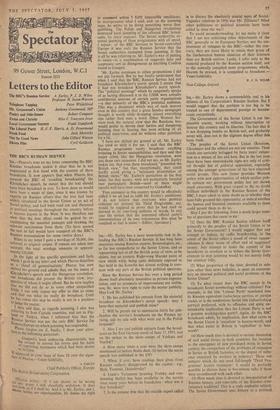Letters to the Editor
The BBC's Russian Service A. Earley, P. J. D. Wiles,
Professor H. Seton-Watson
Telephone Tapping Peter Wi/deblood Mr. Greenwood's Union Anthony Greenwood, MP Poetry and Side-Issues Robert Conquest Evans and Christie Miss F. Tennyson Jesse Local Government Secrecy Frank Stanifin.th The Liberal Party H. F. P. Harris, A. D. Deyermond Fresh Food Jack Merricks Not So Good News John Gillard Watson Eleven Plus Cyril Goldstein
THE BBC'S RUSSIAN SERVICE
SIR,—Pharos's note on my letter concerning the BBC Russian broadcasts makes it clear that he is not acquainted at first hand with the content of these broadcasts. It now appears that when Pharos first accused the BBC of 'avoiding broadcasting' the Khrushchev speech, he meant that the text should have been broadcast in tow. To have done so would have been a waste of time, since it was known by experts on Russian affairs that the text had been widely circulated in the Soviet Union as an act of Soviet policy, and had been read out and discussed at political meetings throughout the country before it became known in the West. It was therefore our view that the best effect could be gained by re- capitulating the essential passages and drawing the relevant conclusions from them. (To have quoted the text in full would have occupied all the BBC's Russian transmissions for some twelve days.)
When in my letter I gave a wordage of 30,000, this referred to original output. If repeats are taken into account, the total wordage amounts to approxi- mately 120,000.
In the light of the specific quotations and facts which I gave in my letter and which Pharos describes as a 'cloud of generalisations,' Pharos has now shifted his ground and admits that, on the issues of. Khrushchev's speech and the Hungarian revolution, our broadcasts did present the British view, irre- spective of whom it might offend. But he now implies that we did not do so in some other unspecified fields. I can only repeat my offer to him to come he find out what we really do broadcast. Until he has taken this step he really is not in a position to fudge the matter.
may add that, as regards jamming, I also was refer
llend to Iron Curtain countries, and not to Fin- and or Turkey, when I informed him that the :Russian Service was not the only BBC Service for Eastern Europe on which jamming was suspended. Please forgive me if, finally, I draw your atten- tion to the following quotation :
Gasquet's least endearing characteristic was his refusal to correct his errors and his habit of reprinting statements which had been shown to be false It appeared i '
n your issue of Tune 28 over the signa- ture Pharos.—Yours faithfully,
A. EARLEY
The British Broadcas Chief Publicity Officer, Europe ling Corporation oti[Pharos 'If I am shown to be wrong not ltaY pint, I will cheerfully withdraw. It does ok as if 1 shall be. And it is Mr. Earley, not I, whose tactics are reprehensible. He denies my right to comment unless I fulfil impossible conditions; he misrepresents what I said; and, on the jamming issue, he seems to be doing something worse than quibbling. The Polish and Hungarian revolutions destroyed local jamming of the relevant BBC broad- casts, by force majeure. The Soviet authorities re- stored jamming of these programmes with all speed. I repeat : of the BBC Services to Soviet-controlled Europe it was only the Russian Service that the Soviet authorities exempted from jamming. If this is all he was referring to, Mr. Earley's way of putting it—twice—is a combination of suggestio falsi and suppressio yeti as disingenuous as anything Coulton found in Gasquet.
`Mr. Earley continues to refute propositions I did not put forward. But he has finally understood that when I said that the BBC Russian Service had not broadcast Khrushchev's secret speech I meant that it had not broadcast Khrushchev's secret speech. The "political meetings" which he sanguinely speaks of as having discussed it in the USSR were actually confidential sessions of certain party organisations —a tiny minority of the BBC's potential audience. This was a document which was of such interest even in this country that a great Sunday newspaper thought it worth while dropping almost everything else rather than miss a word. Other Western Ser- vices took the natural view that the Russians, too, would prefer to devote their furtive and dangerous listening time to hearing this most striking of all political testaments, and do without other pabulum for a bit.
'I have not shifted my ground at all. Mr. Earley has tried to shift it for me. I said that the BBC Russian programme rarely broadcast anything irritating to Soviet susceptibilities, and then said that major crises, like the Hungarian revolution, were just those rare occasions. I did not say, as Mr. Earley makes me, that even these broadcasts "presented the British view," but that, exceptionally, they could hardly avoid giving a "minimum presentation of British views." Mr. Earley's quotations in his first letter, for that matter, were not particularly forceful (nor particularly British—most of them might equally well have been composed by Gomulka).
'Free comment in this country would be effectively stifled if we all had to fulfil Mr. Earley's conditions.
I do not believe that everyone who publicly criticises (or praises) the Third Programme, say, would be required to prove that he had read or listened to its year-long millions of words. In any case the notion that the interested official party's interpretations of its own voluminous files must be accepted as fact is naive.'—Editor, Spectator.]














































 Previous page
Previous page